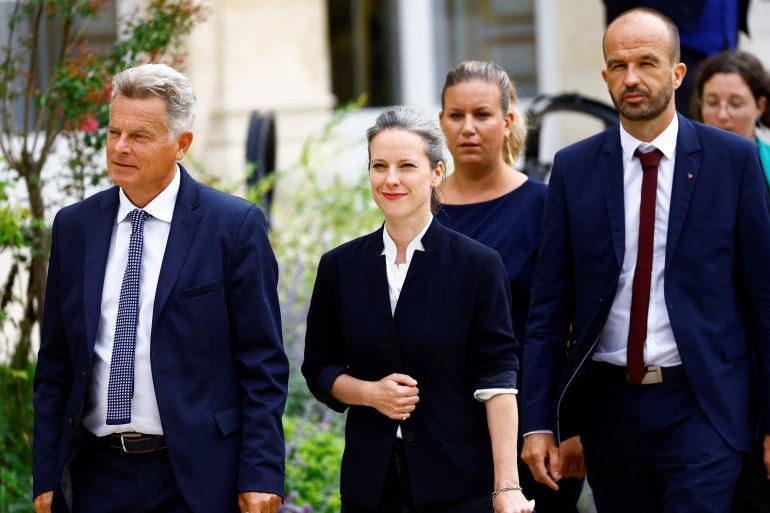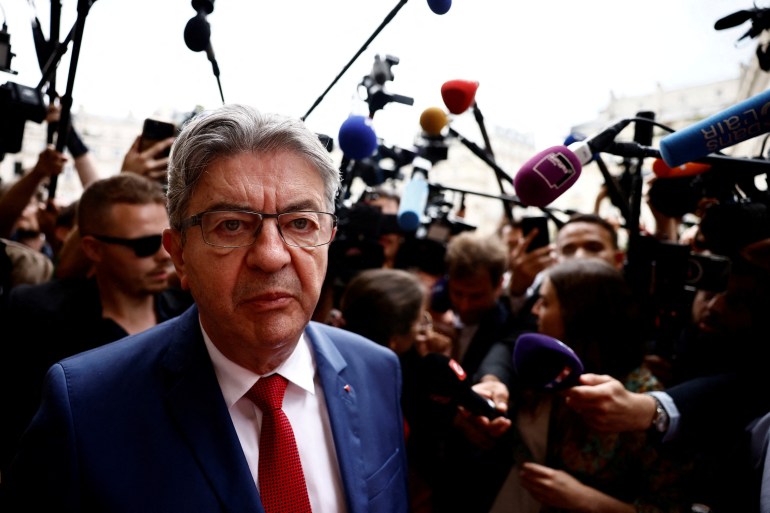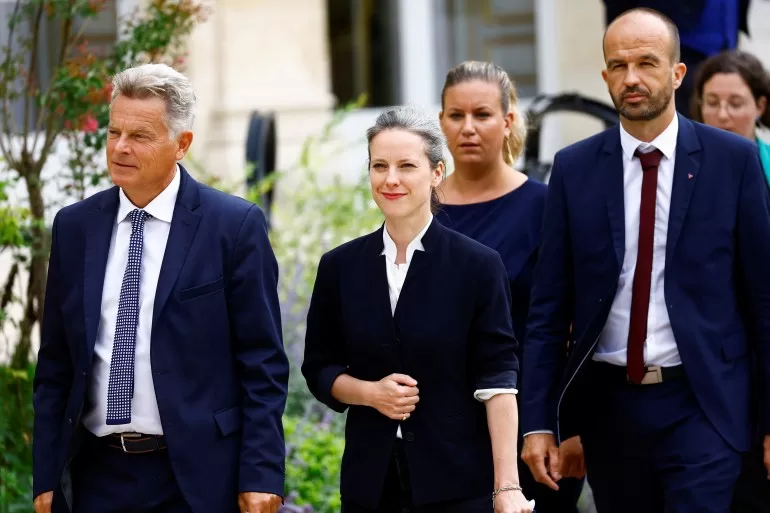France’s President Emmanuel Macron launched a new round of talks with political party leaders on Tuesday to find a way to form a new government and appoint a prime minister.
The French political system was thrown into chaos on Monday night when, following a weekend of talks between party leaders, Macron refused to appoint the candidate proposed for prime minister by the left-wing New Popular Front (NFP) alliance.
While the NFP won the most seats in the recent parliamentary elections, it did not win an overall majority.
The NFP, which is made up of the parties France Unbowed (LFI), the Socialist party (PS), the Greens (EELV) and the Communist Party (PCF), had proposed a relatively unknown civil servant, Lucie Castets, 37, for the prime ministerial role.
But the alliance’s lack of a majority in the National Assembly and its failure to receive backing for its candidate from the other two alliances – Macron’s own centrist Ensemble alliance and the far-right National Rally – means it would be unable to function properly as an effective government, Macron said.
His decision has prompted fury from the left-wing alliance, with some lawmakers calling for him to be impeached.
On Tuesday, he called on the left-wing parties to work harder to cooperate with other parties to create “institutional stability” before a new government could be formed.
“The Socialist Party, the Greens and the Communists have not proposed ways to cooperate with other political forces. It is now up to them to do so,” he said.
So why is France’s parliament in such disarray and what happens next?

What was the result of the election?
The July parliamentary elections left a split parliament with seats in the National Assembly split fairly evenly between the three political alliances.
The NFP won 190 seats, Macron’s centrist alliance 160, and Marine Le Pen’s far-right National Rally took 140.
No alliance or party won the necessary 289 out of 577 seats to secure an absolute majority.
Why did Macron block the NFP’s pick for prime minister?
As head of state, Macron is solely responsible for choosing the prime minister but he is not legally obliged to select a candidate from the largest group in the National Assembly.
Talks with leaders from the other two alliances, including Marine le Pen, leader of the far-right National Rally, over the weekend and on Monday made clear that they would not support the NFP’s choice.
As a result, an NFP-led government would not be able to function, Macron said. He said it would be “immediately censored by all the other groups represented in the National Assembly”.
“My responsibility is that the country is not blocked nor weakened,” Macron said in a statement.
He called on “all political leaders to rise to the occasion by demonstrating a spirit of responsibility”.
However, while he mentioned the Greens, Socialists and Communists in his statement, he left out the hard-left France Unbowed (LFI), which also forms part of the NFP.
Macron has previously referred to the LFI as an “extreme movement”.
The centre and right-wing parties also criticised the NFP’s big spending manifesto, as it comes at a time when the country faces a budget deficit and a debt mountain.
Macron has appointed Gabriel Attal, who became France’s youngest prime minister at the age of 35 in January, as caretaker prime minister. Macron is under pressure to pick a new prime minister as the deadline to present a draft 2025 budget is just a month away.
The LFI reacted with anger to Macron’s comments, with its national coordinator, Manuel Bompard, calling his decision an “unacceptable anti-democratic coup”.
LFI leader Jean Luc Melanchon also demanded a “firm and strong response” by the public and politicians on X on Monday night, and called for a “motion of impeachment” against Macron.
Communist Party leader Fabien Roussel also called for “grand popular mobilisation”.
On Tuesday morning, the LFI published a statement on X urging a “large-scale mobilisation” on September 7, and called on youth organisations and student unions to take to the streets to defend democracy.
The French news outlet, Le Monde, has also argued that in the “interest of democracy” Macron, in the “absence of any other obvious possibility” should have allowed the left-wing candidate to become prime minister.
“To allow the experiment to unfold instead of trying to assert control at all costs in the hope of preserving his policy for as long as possible, even after it has been outvoted,” the outlet wrote in an editorial letter.
“It is harmful to drag out an outgoing government, which acts as if no change had taken place at the ballot box,” it added.
Philippe Marliere, French and European politics professor at the University of London, told Al Jazeera that it was “irrelevant” for Macron to decide beforehand whether or not Castets would have been successful.
“I think an appointment yesterday of Lucy Castets would have been something that you can support, in constitutional terms, because they (NFP) won the election,” he said.
Could Macron be impeached?
Earlier this month, LFI’s Melenchon warned Macron that failure to appoint a left-wing prime minister would result in legal action, suggesting that he would invoke Article 68 of the Constitution which could trigger Macron’s impeachment.
Melenchon repeated his threat of triggering an impeachment process after Macron refused to approve the left-wing alliance’s candidate on Monday.
However, for Macron to be successfully impeached, the motion would have to secure the support of two-thirds of the members of the National Assembly and the Senate, which would be challenging for Melenchon’s party given the NFP does not have a majority.
None of the leaders of other parties that make up the NFP has yet threatened Macron with impeachment.
Since Article 68 was added to the French Constitution in 2007, no president has been impeached.
One attempt in 2016 against then-President Francois Hollande, which was signed by 79 opposition legislators, was defeated in parliament.
That process was triggered after the Socialist president made comments to two journalists which revealed that France’s secret services had carried out four assassinations on his orders – an action which breached security protocols, the rebels asserted. The move to impeach the president then was refused by a parliamentary committee.

What happens next?
Macron said he would restart new talks between party leaders on Tuesday to try to reach an agreement on a new prime minister.
However, the Socialists, the Greens and the Communists have already said they will not participate in further talks.
The LFI, the right-wing National Rally and the conservative Republicans were not invited to the new talks, in a move seen as appeasing moderates.
The Green Party chief, Marine Tondelier, told local radio on Tuesday that the election was being “stolen” from the NFP alliance.
“We’re not going to continue these sham consultations with a president who doesn’t listen anyway … and is obsessed with keeping control. He’s not looking for a solution, he’s trying to obstruct it,” Tondelier said.
Socialist party chief Olivier Faure has also refused to attend new talks with Macron and said he would “not be an accomplice to a parody of democracy”.
Faure added on Tuesday that party members would back a no-confidence motion against any government not put forward by the NFP, accusing the president of looking to “prolong Macronism” despite Macron’s alliance coming second in the election.
What is the most likely scenario?
Marliere told Al Jazeera that the current situation in the country is “absolutely unheard” of and that Macron is “wading into uncharted territory” since the left-wing alliance has already ruled out any alliance with his party.
Following the refusal to approve Castets, Marliere said the only certainty is that Macron will not choose a leftist candidate and will be looking for someone from the centre-left or centre-right. This may work in the short term, he added, but there will most likely be need for another election next year.
“Macron would appoint another prime minister, again, very centrist, moderate profile, and then things would start working. Why? Because people, the public, everyone will get tired of the situation of instability,” he explained, adding that due to the need for government, party members would most likely not call for a dissolution of parliament.
“That’s my bet on what’s going to come next. There will be, by default, a working government, but that can’t last long, and I expect another dissolution and another general election in a year’s time,” Marliere said.
Macron’s office has not set a deadline for the president to announce a prime minister but the legal deadline for the government to present a draft budget law for 2025 is fast approaching on October 1.
